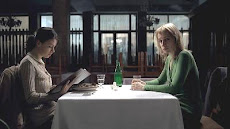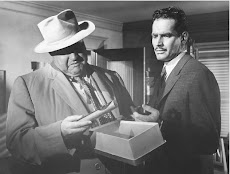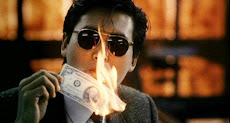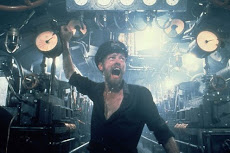I preface this post with the elementary disclaimer that, of course, you shouldn't necessarily mimic what you see on the screen. This is especially true if the movie is called Natural Born Killers. Nevertheless, there are many classical virtues and modern (sadly, malleable) values portrayed in films, some of which we should aim to display in either fantastic or not-so-fantastic situations. Granted, not many of us will get the chance to destroy an alien ship with an explosives-laden biplane before it zaps Area 51, but sacrifice is admirable even in a smaller situation such as, say, in a relationship.
It's unfortunate that virtues like "sacrifice" (or the fortitude behind it), which are good in and of themselves, don't always yield subjectively sweet results. One can be thankful our protagonists did their best, but the end can be a real bear. Take, for example, the smorgasbord of results in films revolving around the age-old theme of falling in love: They don't make movies like Roman Holiday anymore, in which duty supersedes individual happiness, because although some admire Gregory Peck, today's dude is never, ever going to give up Audrey Hepburn without a fight. Perhaps further exploration of notable Dude-Wins-Lady scenarios in film is in order. Or, at least, an attempt at figuring out how we've come so far from the Holiday.
1.) Love Story (1970)
"Love means never having to say your sorry." Gag me. I make no claims to being an expert on love, but this is perhaps the dumbest line in the history of film. I wish there was a way to count how many relationships that otherwise had a chance ended because of this line. Although it makes a few decent attempts to show how privileged kids can weather privileged storms (e.g., disapproving parents and their tired old religion, oh how quaint), the fact that the solution lies in a self-righteous platitude kills this example. Alas, this movie is regarded as a classic in some circles.
2.) Sixteen Candles (1984)
Shifting focus onto an actual dude, there's perhaps no one more aloof in the history of cinema than Jake Ryan (Michael Schoeffling). The object of Samantha Baker (Molly Ringwald)'s desire, men can take away the lesson that the key to a woman's heart is abs, a Porsche 944, a total disregard for our parents' homes (and its furnishings, good grief), and silence. Okay, so Samantha is barely 16 and by the time she made it to college Jake had probably moved on. He's probably living some sort of neuvo-Rabbit lifestyle in Wilkes Barre, Pennsylvania these days, and could throw a football over that mountain. Wait a minute, Samantha wins Jake. Wow. This exploration is not going well thus far.
3.) All the Real Girls (2003)
Player falls in love. Player changes for the better. Player gets dumped after being cheated on. This tragedy is far too realistic and I will never watch this movie again, and I'm not even a player. Perhaps love does mean never having to say your sorry, and human nature drives men and women alike to stomp all over significant others just to test the theory, at least until both sides meet their respective match. Maybe Paul Schneider does learn a valuable lesson, but it comes off as so darned nihilistic I just want to puke.
Now that this journey through bad romantic cinema has caused me to take ill, I must make a transition with a clever quotation that also references vomit:
3.) All the Real Girls (2003)
Player falls in love. Player changes for the better. Player gets dumped after being cheated on. This tragedy is far too realistic and I will never watch this movie again, and I'm not even a player. Perhaps love does mean never having to say your sorry, and human nature drives men and women alike to stomp all over significant others just to test the theory, at least until both sides meet their respective match. Maybe Paul Schneider does learn a valuable lesson, but it comes off as so darned nihilistic I just want to puke.
Now that this journey through bad romantic cinema has caused me to take ill, I must make a transition with a clever quotation that also references vomit:
Look, we're gonna spend half the night driving around the Hills looking for this one party, and you're going to say it sucks. And we're all gonna leave and then we're gonna go look for this other party. But all the parties and all the bars, they all suck. I spend half the night talking to some girl who's looking around the room to see if there's somebody else who's more important she should be talking to, and it's like I'm supposed to be all happy 'cause... she's wearing a backpack, you know? And half of them are just nasty skanks who wouldn't be nothing except they're surrounded by a bunch of drunken, horny a**holes. And I'm gonna tell you something , T. Are you listening? I'm not gonna be one of those a**holes. Alright? It just makes me sick. It's like, some nasty skank who isn't half the woman my girlfriend is is gonna front me? It makes me want to f***in' puke!(Censored. For the kids.)
In the end, I hope, a man should just do his best: This is perhaps the reason behind the timelessness of Swingers, High Fidelity, and About Schmidt. If there are answers to the chick flick besides The Dirty Dozen and First Blood, these are surely them. And even if they can be classified as "Male Movies" or what have you, they certainly put every Freddie Prince, Jr. film to shame.
4.)...
No. I'm re-starting this list. You don't put these movies on a list with Love Story. There are rules.
1.) Swingers (1996) (Source of quote above)
Posters for this film adorn college dorm rooms with only slightly less frequency than Scarface, undoubtedly as shrines to Vince Vaughn's timeless portrayal of Trent. I imagine that the ending of the film and the main character, Mikey, escape most young male viewers completely. There's plenty to learn from Trent about confidence and good humor, but there's just as much to be learned from Mikey's resolve and his honest heart. Repeated viewing (and not drunk with your frat brothers) is required. Much like Big Lebowski, this film is one that can be loved and respected even if it has a huge following.
2.) High Fidelity (2000)
In between perhaps the best combination of one-liners and bestowal of new cool onto nerdom ever put on film is John Cusack's opus. Considering this is the man who gave girls Say Anything and The Sure Thing, he probably owed his gender more than we thought he could repay. Thankfully, we were wrong. Rob Gordon's (Cusack's) narration of his lifelong battles with himself (projected onto various women) is poignant and and timeless. Men who can't relate are either (1) Jake Ryan (see #2 on previous list) or (2) Lying. If there was ever a justification for introspection that frequently teeters into narcisism, it's Rob's recognition of his faults and his commitment to be a better man. Furthermore, it's nice to see persistence pay off:
3.) About Schmidt (2002)
4.)...
No. I'm re-starting this list. You don't put these movies on a list with Love Story. There are rules.
1.) Swingers (1996) (Source of quote above)
Posters for this film adorn college dorm rooms with only slightly less frequency than Scarface, undoubtedly as shrines to Vince Vaughn's timeless portrayal of Trent. I imagine that the ending of the film and the main character, Mikey, escape most young male viewers completely. There's plenty to learn from Trent about confidence and good humor, but there's just as much to be learned from Mikey's resolve and his honest heart. Repeated viewing (and not drunk with your frat brothers) is required. Much like Big Lebowski, this film is one that can be loved and respected even if it has a huge following.
2.) High Fidelity (2000)
In between perhaps the best combination of one-liners and bestowal of new cool onto nerdom ever put on film is John Cusack's opus. Considering this is the man who gave girls Say Anything and The Sure Thing, he probably owed his gender more than we thought he could repay. Thankfully, we were wrong. Rob Gordon's (Cusack's) narration of his lifelong battles with himself (projected onto various women) is poignant and and timeless. Men who can't relate are either (1) Jake Ryan (see #2 on previous list) or (2) Lying. If there was ever a justification for introspection that frequently teeters into narcisism, it's Rob's recognition of his faults and his commitment to be a better man. Furthermore, it's nice to see persistence pay off:
Hopefully women love this, too.Laura: I'm too tired not to be with you.
Rob: What, so if you had a bit more energy we'd stay split up, but things being as they are, with you being wiped out and all, you want to get back together? Is that it?
Laura: Yeah.
3.) About Schmidt (2002)
I should preface my discussion of this film with this helpful visual aid from Microsoft Excel:

I'm glad to see we've achieved heights after our rocky start! This post may be setting new standards for the low-brow prong of "High and Low Brow Commentary on Film," but it's late and studying Illinois Civil Practice does strange things to men.
Jack Nicholson, whose films Chinatown and Five Easy Pieces deserve their own respective posts entirely, tops off the top three films all men should see in the realm of dude wins lady because, well, he's a man who loses his wife, and discovers he lost her long before that. About Schmidt takes top honors because Nicholson comes to forgive and to ask forgiveness from those he's wrong and who have wronged him alike; that all men could learn to do his before they grow old. It's nice that in between trash like Anger Management and The Bucket List (yes, I said it. No, it's not a good movie. Stop saying words.) Nicholson managed to make this.
In conclusion (as if I had a thesis to begin with), there are great examples out there of how to be a man in the realm of love and sensitivity. And, please, don't see The Proposal.
Jack Nicholson, whose films Chinatown and Five Easy Pieces deserve their own respective posts entirely, tops off the top three films all men should see in the realm of dude wins lady because, well, he's a man who loses his wife, and discovers he lost her long before that. About Schmidt takes top honors because Nicholson comes to forgive and to ask forgiveness from those he's wrong and who have wronged him alike; that all men could learn to do his before they grow old. It's nice that in between trash like Anger Management and The Bucket List (yes, I said it. No, it's not a good movie. Stop saying words.) Nicholson managed to make this.
In conclusion (as if I had a thesis to begin with), there are great examples out there of how to be a man in the realm of love and sensitivity. And, please, don't see The Proposal.
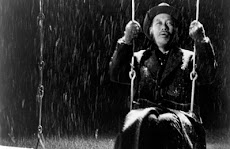

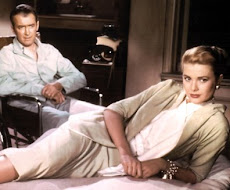_01.jpg)
